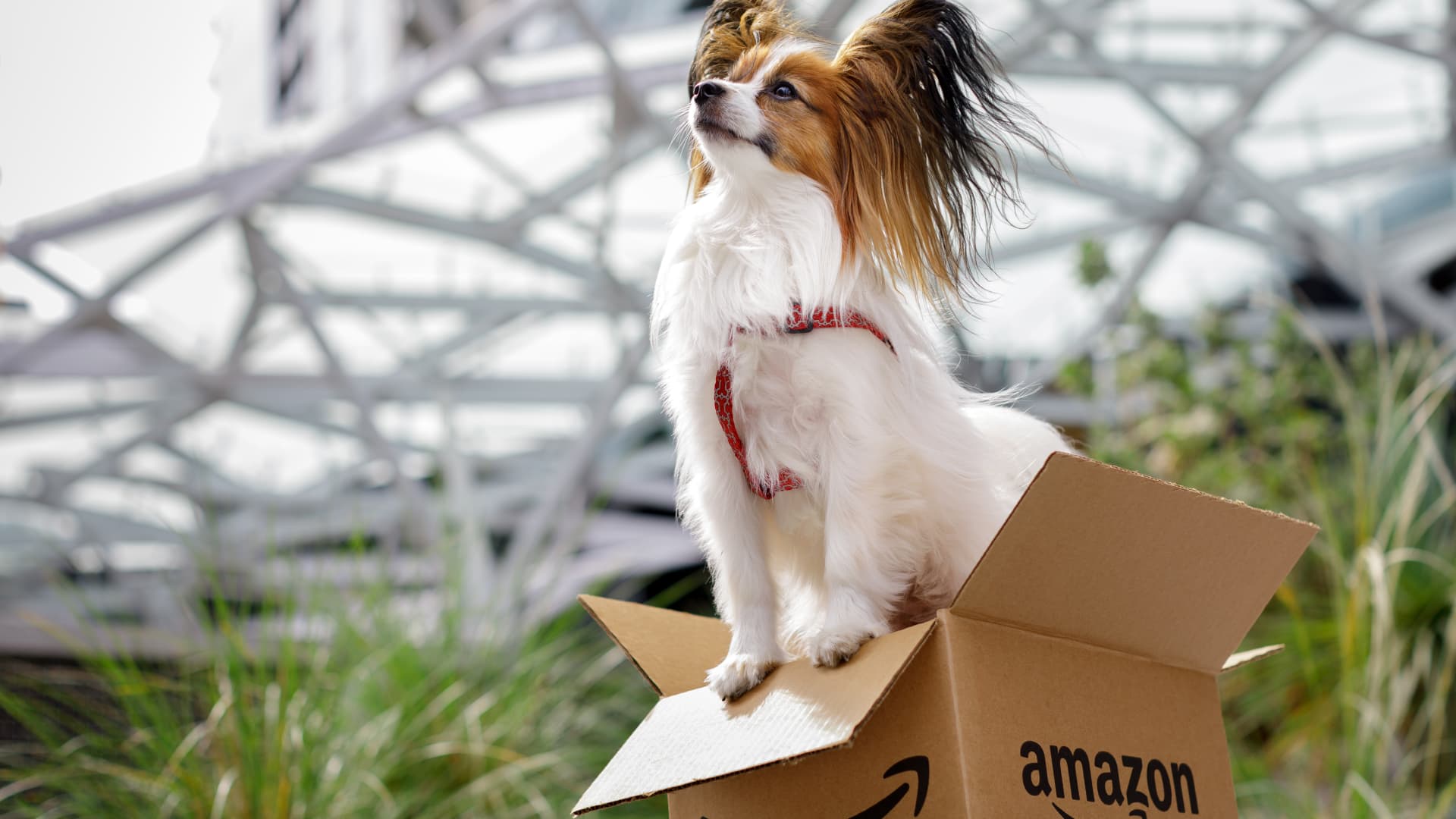Amazon is considering an expansion into veterinary telehealth in its latest bid to compete with Walmart, which began offering the service to Walmart+ subscribers earlier this year, people familiar with the matter told CNBC.
The e-commerce giant, which has already expanded into human health with its acquisition of One Medical, is a dominant player in pet food and supplies. But it has not so far meaningfully invested in pet health, which is expected to drive growth in the $137 billion pet market.
The people who discussed Amazon’s consideration of the vet service declined to be named because the discussions are private.
Veterinary telehealth allows pet parents to have virtual appointments with veterinarians and veterinary technicians. The service is similar to human telemedicine.
Earlier this year, Walmart signed a deal with veterinary telehealth provider Pawp to offer Walmart+ subscribers free access to the startup’s membership for a year. The offering is set to expire Nov. 19, less than a week before Black Friday and right around the time the pet holiday shopping season begins.
Amazon could turn to Pawp to fuel a potential pet telehealth offering in time for the holiday season because Pawp has already proven it can scale with a large retailer. Amazon could also partner with one of the dozens of other pet telehealth startups on the market or build its own practice, which is what Chewy did when it began offering the service during the Covid pandemic.
As Amazon’s efforts to expand its health-care business show mixed results, the company has signaled that the pet market is a priority. Earlier this year, it spent big on a heartwarming Super Bowl ad that featured a rescue dog and how its family turned to Amazon when it needed supplies.
Amazon declined to comment.
Pet health to fuel market boom
Amazon’s potential foray into veterinary telehealth comes as the pet market becomes more competitive and retailers race to expand their offerings.
As more and more mass retailers offer pet staples like food and toys, companies like Chewy, Walmart and Petco are expanding into pet health to stay competitive and grow their market share.
The U.S. pet market is expected to grow to $200 billion by the end of the decade, and pet health care is driving that boom, according to research from Bloomberg Intelligence published earlier this year.
Chewy has focused on building out its pet prescription, insurance and telehealth offerings. Petco has leaned on its brick-and-mortar footprint to develop clinics and grooming centers, making it one of the leading veterinary providers in the nation.
Beyond its partnership with Pawp, Walmart recently announced plans to open a dedicated pet services center in Dallas, Georgia, as a pilot for what could become a larger program, the company previously told CNBC. The center, which will be staffed by employees of vet care and pet product company PetIQ, will offer a range of vet and grooming services, such as wellness exams, teeth cleanings and haircuts.
If Amazon does move forward with a pet telehealth program, it could take a similar approach to Walmart and offer it through its Amazon Prime subscription service.
The heart of the value propositions for both Amazon Prime and Walmart+ is unlimited free deliveries, but the paid subscription services also offer a host of competing perks that are designed to incentivize sign-ups and reduce churn.
Perks that come along with the subscription services – such as Amazon Prime’s GrubHub+ offering and Walmart+’s addition of Pawp – are also designed to set the two offerings apart and keep the subscription services competitive.
Lobbying for change
Veterinary telehealth arose during the pandemic out of necessity, and the industry has grown as a convenient alternative to in-person visits. But some vets say the practice could be risky for pets.
Dr. Lori Teller, former president of the American Veterinary Medical Association and a professor of telehealth at Texas A&M University, said pet telehealth can be beneficial, but she has concerns about companies that could be using it to drive product sales.
“That’s when we can get into trouble with either delayed treatment or misdiagnosis, particularly when the emphasis is more on the product than the best thing for the animal,” Teller told CNBC in a recent interview. “The ones that are providing general advice and triage services are a benefit to the profession, definitely helps for after-hours issues or if you’re having a really busy day.”
A labyrinth of state and federal laws governing pet telehealth, and what veterinarians are permitted to do if they’ve never met an animal in person, has been a roadblock to expanding pet telehealth. It has sparked a growing lobbying movement to change regulations.
Corporate giants, such as Chewy and Mars Veterinary Health, a subsidiary of pet food and candy conglomerate Mars, have helped to fund those efforts. Amazon may be throwing its hat in the ring, as well.
So far this year, Amazon and its affiliated businesses have spent around $430,000 on lobbying efforts that target “digital health oversight,” “telemedicine” and the Food and Drug Administration, among other issues, according to Senate disclosure reports.
It’s unclear if the efforts were directed at pet or human health, or both.
